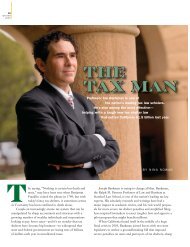Summer 2003 – Issue 66 - Stanford Lawyer - Stanford University
Summer 2003 – Issue 66 - Stanford Lawyer - Stanford University
Summer 2003 – Issue 66 - Stanford Lawyer - Stanford University
- No tags were found...
You also want an ePaper? Increase the reach of your titles
YUMPU automatically turns print PDFs into web optimized ePapers that Google loves.
NICKI LOCKER 15STANFORDLAWYERlevel management" at Wilson Sonsini.What makes Locker's success all the more remarkable isthat securities litigation remains one of the last male bastionsin the legal profession. For better or worse, there's a machismoto the field, and a widespread perception remains thatwomen face a tougher time being rainmakers in such highstakecases, says Feldman. Locker, however, has managedto build a strong client list, including Agilent Technologies,Guidant, 12 Technologies, Juniper Networks, NetworksAssociates, and Veritas Software, among others.Settling with ReformsNo case has done more for Locker's reputation for being onthe leading edge of securities litigation than a giant shareholderlawsuit charging that the stock prices of several hundredinitial public offerings were fraudulently inflated. Itinvolves 309 companies that went public and the 55 brokeragefirms that underwrote the offerings. There are dozensof defense lawyers on the case, but Locker represents moreissuers than anyone else-50 high-tech companies-and shewas one of the two defense lawyers for the issuers who presentedoral arguments in the case.After U.S. District CourtJudge Shira A. Scheindlindeclined to dismiss the claims, Locker and the other lawyersrepresenting the issuers worked with the insurance companiesto hammer out a proposal for an unprecedented settlement,guaranteeing to pay investors $1 billion if the plaintiffsAssuming the settlement goes through, it will be a coupfor the issuers. The guarantee would average out to roughly$3.3 million per issuer, to be paid-if at all-by the insurers."The issuing companies probably view Nicki as a hero," saysGrundfest. "It may get them out of this complex litigationwithout having to dig into corporate pockets."The deal, however, is also significant for what it showsabout corporate defense lawyers being willing to step up andreform corporate practice. Whether the issuers publiclyaccept the plaintiffs' argument that they should have beenaware of the alleged stock manipulations by the underwriters,the settlement places the issuers in the position ofadding pressure to the underwriters to improve their practices.Ne71' York Times reporter Gretchen Morgenson writesthat the proposed settlement creates an incentive for thecompanies to assist the plaintiffs' lawyers in their actionagainst the Wall Street firms. Locker says it's too soon to saywhether that incentive will lead to any action. But MelvinWeiss, the lead lawyer on the other side, told Morgensonthat the agreement would require issuers to provide documentsand other support to the shareholder lawyers.The IPO case is unique among securities cases in itsscale and its focus on public offerings. But even in more typicalcases, Locker has demonstrated an ability to win for herclients, while also improving corporate practices. Take herrepresentation of Network Associates, a company that hadacknowledged problems in its accounting and had restated"The issuing companies probably view Nicki as a hero,"says Law Professor Joseph Grundfestdo not win at lcast that much from the underwriters. "This isthe mother of all securities settlements," remarks JeffRudman, a partner at Hale and Dorr who serves with Lockeron the steering committee of lawyers representing the issuers.The settlement proposal, which has yet to be approved,is not the work of one lawyer, but Rudman describes Lockeras invaluable in working through the "endless negotiations"with insurance lawyers and plaintiffs' lawyers. "If there's asemicolon missing on page 42, she'll find it," he says. Andshe made sure that the very complicated formulas in the dealwere not obfuscated in jargon, but spelled out clearly. SaysRudman: "Other folks in the room might be abashed at saying,'I don't know what this means,' but Nicki would interrupt,'Look fellows, I know you're all geniuses, but whydon't you explain it to me, because I know I'm not stupid.'"(One colleague refers to Locker as Columbo with a St.John's wardrobe.) The problem often wasn't with Locker,but with a clause that didn't make sensc.its earnings and revenues.Locker and other lawyers at Wilson Sonsini aggressivelyfought a class action lawsuit against their client, and in Marchthey succeeded in having a large portion of the fraud claimsdismissed. The briefs highlighted her encyclopedic grasp ofthe facts. They persuaded the judge, for instance, that theplaintiffs' confidential witnesses didn't have the basis toknow the information that they had provided the plaintiffs.And the judge was also convinced that the complaint's allegationsweren't "sufficiently particularized" to state a claimfor revenue recognition fraud.In the past, such a court outcome would have been sufficientrepresentation for a corporate attorney, but Locker didmore. She scrutinized the company's operations, and, in theareas where it did not meet best practices, she worked withthe new management to make improvements. Kent Roberts,general counsel at Network Associates, says that the first fewtimes he met her, it didn't feel like she was working for him,
















